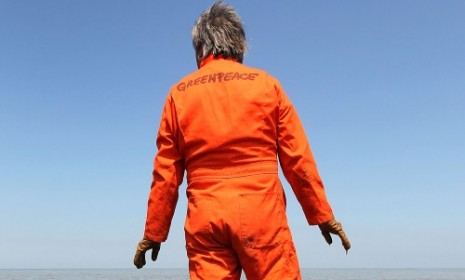BP spill: Hitting the East Coast soon?
Oil has now reportedly been spotted in the Gulf of Mexico's "loop current." Here's a concise update on what that could mean

A free daily email with the biggest news stories of the day – and the best features from TheWeek.com
You are now subscribed
Your newsletter sign-up was successful
It is almost a month since the Deepwater Horizon oil rig exploded on April 20, sinking into the ocean and causing millions of gallons of oil to spew into the Gulf of Mexico. Oil has now been spotted in the Gulf of Mexico's "loop current." What is that, and does it mean that East Coast beaches will soon be slathered with oil? (Watch a CBS report about tar washing up in Florida)
What is the "loop current"?
It's a warm ocean current that flows west from Cuba into the Gulf of Mexico and then loops back out east through the Florida Straits and into the Atlantic. (See a map of the area.)
The Week
Escape your echo chamber. Get the facts behind the news, plus analysis from multiple perspectives.

Sign up for The Week's Free Newsletters
From our morning news briefing to a weekly Good News Newsletter, get the best of The Week delivered directly to your inbox.
From our morning news briefing to a weekly Good News Newsletter, get the best of The Week delivered directly to your inbox.
How much oil is in it?
Little, so far. "Trace amounts" have been spotted at the very edge of the current, according to University of South Florida, as quoted in the St. Petersburg Times. Federal officials say the risks are low, reports The New York Times, "but two independent scientists, analyzing ocean current and satellite data," spotted oil "in an eddy that was quickly being drawn into the current, portending a much wider spread of the hazardous slick."
How likely is it that masses of oil will enter the current?
If the giant plumes of oil discovered deep in the Gulf become part of the current, then it could have a dramatic impact on the Florida Keys. But, given the uncertainties surrounding these plumes, at this point scientists have only theories.
A free daily email with the biggest news stories of the day – and the best features from TheWeek.com
What will happen if the oil reaches Florida's shore?
In a worse case scenario, it could devastate the coral reefs in the shallows of Florida's coast, poisoning its fragile ecosystem. But, depending on the amount and consistency of the oil, it could also wash ashore as tar balls (a phenomenon that's already being reported in Key West; see video) or disperse in deeper water.
Could the oil travel further north than Florida?
Large amounts of oil streaming into the loop current could wash up as far north as coastal North Carolina, but it could also disperse into the deeper waters of the Atlantic Ocean.
What is the government saying about the loop current?
"We know that the oil has not entered the loop current at this time," said Rear Admiral Mary E. Landry of the Coast Guard on Monday. "There may be some leading edge sheen that’s getting closer to the loop current, but this spill has not entered the loop current proper."
Is BP making any progress on plugging the leak?
Varying reports have BP siphoning off 1,000 or 2,000 barrels a day (between 25 and 40 percent of the flow) from the ruptured well (though skeptics question the math). A permanent solution, in the form of a specially-constructed relief well, could be as far as two months away.
Sources: The New York Times (2), St. Petersburg Times, Business Week, Sun Sentinel
.......................................................
RELATED COVERAGE ON THE WEEK:
• Instant Guide: What the "shocking" oil plumes mean for the Gulf?
-
 Film reviews: ‘Send Help’ and ‘Private Life’
Film reviews: ‘Send Help’ and ‘Private Life’Feature An office doormat is stranded alone with her awful boss and a frazzled therapist turns amateur murder investigator
-
 Movies to watch in February
Movies to watch in Februarythe week recommends Time travelers, multiverse hoppers and an Iraqi parable highlight this month’s offerings during the depths of winter
-
 ICE’s facial scanning is the tip of the surveillance iceberg
ICE’s facial scanning is the tip of the surveillance icebergIN THE SPOTLIGHT Federal troops are increasingly turning to high-tech tracking tools that push the boundaries of personal privacy